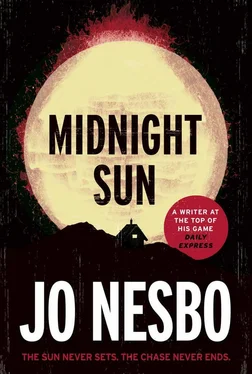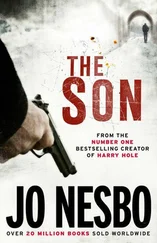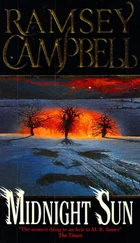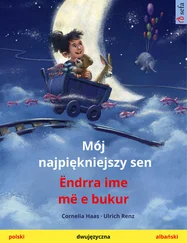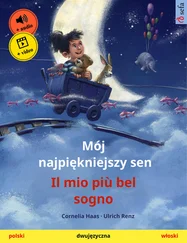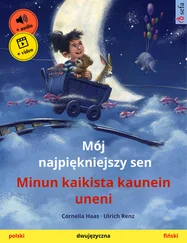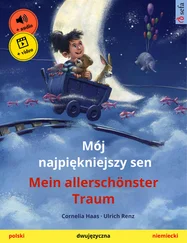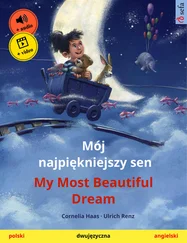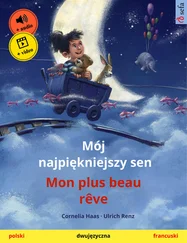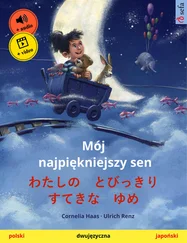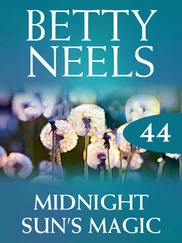We carried on walking, and my mind must have been on something else entirely when my eyes registered a movement, something much bigger than the midges, something a hundred metres ahead of us, something suddenly emerging from the monotonous landscape. My heart felt as though it stopped for a moment. There was an odd clicking sound as the heavy-antlered creature ran off through the heather.
‘A buck,’ Knut declared.
My pulse slowly calmed down. ‘How do you know it’s not a... er, one of the other sort?’
He gave me that funny look again.
‘We don’t get many reindeer in Oslo,’ I said.
‘A doe. Because bucks have bigger horns, don’t they? See, it’s rubbing them against that tree.’
The reindeer had stopped in a cluster of trees behind the cabin and was rubbing its antlers against a birch trunk.
‘Is it scraping off bark to eat?’
He laughed. ‘Reindeer eat lichen.’
Of course, reindeer eat lichen. We’d learned about the types of moss that grow up here close to the North Pole in school. That a joik was a sort of improvised shouting in Sámi, that a lavvo was a form of Indian teepee, and that Finnmark was further away from Oslo than London or Paris. We also learned a way of remembering the names of the fjords, although I doubt anyone could recall what it was now. Not me, anyway — I’d made it through fifteen years of education, two of them at university, even, by half-remembering things.
‘They rub their horns to clean them,’ Knut said. ‘They do that in August. When I was little, Grandpa said it was because their horns itched so badly.’
He smacked his lips like an old man, as if to lament how naive he had once been. I could have told him that some of us never stop being naive.
The cabin stood on four large rocks. It wasn’t locked, but I had to tug the door handle hard to loosen it from the frame. Inside were a pair of bunk beds with woollen blankets, and a wood-burning stove with a dented kettle and a casserole dish sitting on its two hotplates. There was an orange wall cupboard, a red plastic bucket, two chairs and a table that leaned towards the west, either because it was crooked or because the floor was uneven.
The cabin did have windows. The reason I hadn’t seen them was that they were just embrasures, narrow slits in all the walls except for the one with the door in it. But they let in enough light, and you could see anything approaching from every direction. Even when I walked the three steps from one end of the cabin to the other and felt the whole building wobble like a French coffee table, it didn’t change my initial conclusion: the cabin was perfect.
I looked round and thought of the first thing Grandfather said when he had carried my trunk up to his house and unlocked it: Mi casa es tu casa . And even though I didn’t understand a word, I still guessed what it meant.
‘Do you want coffee before you walk back?’ I asked nonchalantly as I opened the wood-burning stove. Fine grey ash blew out.
‘I’m ten years old,’ Knut said. ‘I don’t drink coffee. You need wood. And water.’
‘So I see. A slice of bread, then?’
‘Have you got an axe? Or a knife?’
I looked at him without replying. He looked up at the ceiling in response. A hunter with no knife.
‘You can borrow this for the time being,’ Knut said, reaching behind his back and pulling out an enormous knife with a broad blade and a yellow wooden handle.
I turned the knife in my hand. Heavy, but not too heavy, and nicely balanced. Pretty much the way a pistol should feel.
‘Did you get this from your dad?’
‘From Grandpa. It’s a Sámi knife.’
We agreed that he would gather wood while I fetched water. He evidently liked being given a grown-up task, and grabbed the knife back and ran out. I found a loose plank in the wall. Behind it, between the two walls, was a sort of insulation made of moss and turf, and I pushed the money belt into that. I could hear the sound of steel against wood from the clump of trees as I filled the plastic bucket in the stream that ran just a hundred metres from the cabin.
Knut put some kindling and bark in the stove while I cleared the mouse shit from the cupboard and put the food away. I lent him my matches and before long the stove was alight and the kettle was hissing. Some smoke leaked out, and I noticed that the midges were holding back. I took the opportunity to take my shirt off and splash some water from the bucket on my face and upper body.
‘What’s that?’ Knut asked, pointing.
‘This?’ I said, taking hold of the dog tag hanging round my neck. ‘Name and date of birth engraved on bombproof metal, so they know who they’ve killed.’
‘Why would they want to know that?’
‘So they know where to send the skeleton.’
‘Ha, ha,’ he said drily. ‘ Doesn’t count as a joke.’
The hissing of the kettle was replaced by a warning rumble. As I filled one of the two chipped coffee cups, Knut was already halfway through his second thick slice of bread with liver pâté. I blew on the black, greasy surface of the coffee.
‘What does coffee taste like?’ Knut asked with his mouth full.
‘The first time’s always the worst,’ I said, and took a sip. ‘Eat up, then you’d better get going before your mum wonders where you are.’
‘She knows where I am.’ He put both elbows on the table and leaned his head on his hands, pushing his cheeks up over his eyes. ‘Joke.’
The coffee tasted perfect, and the cup warmed my hands. ‘Have you heard the one about the Norwegian, the Dane and the Swede, who had a bet to see who could lean furthest out of the window?’
He took his arms off the table and stared at me expectantly. ‘No.’
‘They were sitting on the windowsill. And suddenly the Norwegian won.’
In the silence that followed I took another sip. I assumed from Knut’s gawping expression that he hadn’t figured out that was the end of the joke.
‘How did he win?’ he asked.
‘How do you think? The Norwegian fell out of the window.’
‘So the Norwegian bet on himself?’
‘Obviously.’
‘ Not obviously. You should have said that from the start.’
‘Okay, but you get the point,’ I sighed. ‘So what do you think?’
He put one finger under his freckled chin and stared thoughtfully into space. Then came two loud bursts of laughter. Then more thoughtful staring.
‘A bit short,’ he said. ‘But that’s probably what makes it funny. Bang — it’s all over. Well, it made me laugh.’ He laughed a bit more.
‘Speaking of things being over...’
‘Of course,’ he said, standing up. ‘I’ll come back tomorrow.’
‘Really? Why?’
‘Midge oil.’
‘Midge oil?’
He took my hand and put it to my forehead. It was like bubble wrap, bump upon bump.
‘Okay,’ I said. ‘Bring midge oil. And beer.’
‘Beer? Then you’ll—’
‘Burn in hell?’
‘Have to go to Alta.’
I thought about the smell in his father’s workroom. ‘Hooch.’
‘Huh?’
‘Home brew. Moonshine. Whatever your father drinks. Where does he get it from?’
Knut shifted his weight a couple of times. ‘Mattis.’
‘Hmm. Bow-legged little fellow in a torn anorak?’
‘Yes.’
I took a note out of my pocket. ‘See how much you can get with this, and get yourself an ice cream. Unless that’s a sin, of course.’
He shook his head and took the note. ‘Goodbye, Ulf. And keep the door closed.’
‘Oh, there probably isn’t room for any more midges in here.’
‘Not midges. Wolves.’
Was he kidding?
When he had gone I picked up the rifle and rested it on one of the sills. I looked through the sights as I swept the horizon. I found Knut as he skipped away down the path. I carried on towards the little patch of woodland. I found the buck. At that moment it raised its head, as if it could sense me. As far as I knew, reindeer were herd animals, so this one must have been expelled. Like me.
Читать дальше
